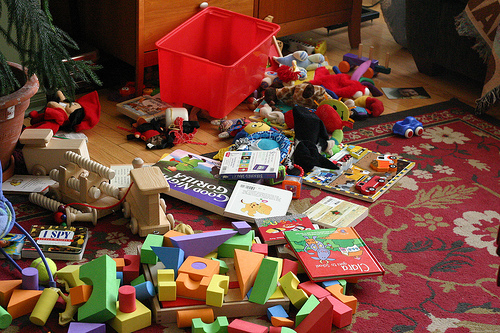When do you that say you are done with something? Do you say, “I am done with lunch”, when you have eaten the last morsel off your plate or after you wash your plate and set it carefully in the utensil drying rack?
As a software developer, do you say, “And I am done!” as soon as your code works for a single sample data only on your laptop or do you say so after having run the tests and having merged your code with those of others over a version control system (e.g. GitHub), having run the tests again and then having committed all of your final changes for everyone to use?
After shopping, are you done as soon as you enter home and drop your shopping bags? Or do you consider it done after each item has been taken out of each shopping bag and put away neatly into shelves, bottles, containers, wardrobe or supplies room?
Here is my answer. If someone is having to clean up and reorganise after you, then you are not done. When you are done, there should be no mess left behind for someone else — even yourself — to bother with.
The three-phase process for every activity
Every activity, big or small, has three phases: preparation, execution and clean-up or re-organisation. While execution is the most important phase, it is over-rated at the expense of the other two. Cleanup and re-organisation are overlooked even by those who are usually stars at execution.
But cleaning up and re-organising after your stellar performance is very important because the other people have the right to a stage that was as ready and prepared as it was when you arrived. Re-organisation is a way of life that shows that you follow diligence and discipline. It shows that you have gratitude, respect and empathy for others. Few people like those star performers whose mess they have to clean up.
Not cleaning up and reorganising is childish
When he was two years old, my nephew would often play with his toys away from his painstakingly organised (by his mom and dad of course) toy room and misplace them under couches, under their bed and on the porch outside home. As far as he was concerned, he was ‘done’ as soon as his game was over (execution phase only). Every day, he would pester his mom (my sister) to find the misplaced toys for him, whining and raising a hue and cry until they were found. My exasperated sister would lose several minutes on what was the most important task in her schedule while trying to help her son out of his own mess.
I used to feel bad for my sister, but I also understood that two-year old children cannot fathom the importance of re-organisation after every play session. So cleaning up the mess of ‘terrible twos’ is something parents inherently sign up for as soon as they decide to conceive.

But when it comes to re-organisation, some people stay in child mode well into adulthood. While getting ready for office and already delayed, a woman I know walked to her mother and asked with hands on hips, “Where did you put my black leggings? I intend to wear them today”. The tone of her voice and the posture made it clear that it was the mother who was ‘responsible’ for her black leggings’s whereabouts! In the midst of a frantic morning the mother was trying to get my acquaintance’s breakfast ready, her packed lunch ready and her father’s breakfast ready. And here my acquaintance was putting one more task on her mother’s plate! Why did this happen?
As far as my acquaintance was concerned, after she wore her black legging the previous time, she was ‘done’ with it as soon as she changed into something else. Her ‘done’ sequence was not more elaborate. From among the family’s clothes that had been washed in the washing machine and hung out to dry, she did not fetch her own clothes. She did not fold them and stack them in her wardrobe herself. Otherwise her black leggings would have been where they should have been the next time she wanted them. As far my acquaintance was concerned, those steps belonged to her mom. She hadn’t taken ownership of the leggings other than wearing them (again, execution phase only).

And she is not alone. While my acquaintance is one of the rare females I have seen do this, I know several men who do this to their mothers and wives with impunity every day, while shirking their responsibilities and instead engaging in TV, phone calls, Facebook updates, YouTube videos and WhatsApp forwards. Grow up. It is not ‘manly’ to shirk household chores and organisation by considering them ‘women’s work’. It is childish.
Steps to ensure ‘doneness‘
Are you ready to level up your doneness? Are you ready to move past the day when you say ‘I am done!’ and people around you say, ‘Yeah, right!… Smirk!’.
The first step is to learn what each activity’s doneness looks like. You should ask yourself the question, “Once I am really done with something and the next person (that includes me) wants to use it, in what condition do they expect to find it?” Let’s take the first paragraph as the example.
Several hours after lunch, when you want to have your next meal, you want to have clean plates in a neatly organised rack of plates, not having to fish them from a sink and washing dried food debris from them. In software projects, when you say that you are done, your project mates expect to download your latest code the next time they accesses the version control system. They wouldn’t like it if the version control still contains stale code. They also assume that basic tests have been run and that the software is ready for advanced testing and alpha release. You or your family expect to find fresh items inside pantry, shelves, wardrobes or the supply area. No one would like to fish for the new items from the depths of a shopping bag still lying at your front door.
Now that you know what the real ‘doneness’ looks like, you should list the steps between what you are calling ‘done’ right now and what the real ‘done’ looks like.
Finally, follow through the steps, taking help from people around you. E.g. a stronger person to move sacks of wheat and a taller person to tuck infrequently used items to higher shelf racks.
An exercise
Here is an exercise to practise the importance of re-organisation. For an entire week, I want you to take up one, just ONE activity from your household, to manage from start to finish. If you have been doing part of that activity, I want you to own it from start to finish. If you have been putting off that activity all life, then here is your start. All of it is yours.
Every phase, i.e. preparing, execution and clean-up / reorganisation is yours. No help allowed. From your parents or parents-in-law. From your spouse. From your siblings or siblings-in-law. From friends. None. Every step must be done by you.

Are you a man who can cook, but have been pushing the task to your wife all the while, considering it to be HER expertise? Get ready for the entire week’s meal. That includes planning every day’s breakfast, lunch and dinner, shopping for groceries, cutting and preparing ingredients, cooking, serving, cleaning up the pots, pans and dishes and finally stacking the clean and dry utensils on their shelves.
Has your room been cleaned by your mother all this time? Well, get up and clean it yourself. All week. That includes, dusting, sweeping, mopping, putting things away where they belong, changing upholstery, swabbing delicate items like ceramics, using the right cleaning agent on the right material, making beds, plumping pillows, smoothening couch covers, shining and polishing metal parts such as door knobs, faucets and handles. It’s all yours this week. No help allowed.
Why should you go through this exercise? It teaches you that the things you have been taking for granted all your life actually require hard work, diligence, discipline, consistency and commitment. If you have been living off the diligence of others all this while, an exercise like this will help you learn to share the workload and appreciate others’s contribution to your life’s cosiest moments.
You will learn that lunch may come to your hands and the empty plate may leave your hands like magic, but someone puts in incredible effort to prepare the food. And continues to work incredibly hard to clean up and re-organise after the meals. You will appreciate that dirty clothes don’t wash themselves, dry themselves, fold themselves and find their way into the wardrobe after you discard them into the hamper and change into cleaner clothes. In fact the cleaner set was possible because someone refused to call it ‘done’ after you said, ‘I am done with these clothes for today’ and tossed them aside.
Conclusion
The idea of ‘I am done’ may be quite shallow if you haven’t been cleaning up and reorganising after yourself. In fact, your ‘I am done’ may be the cue for the phrase, ‘Sigh, I am done for’, for those around you who have to sort through your mess, be it your parents, spouse or your project leader. But if you are the diligent one who makes sure that everyone else finds things where they need to be, then bravo. If your ‘I am done’ makes your world a better place for yourself and for those around you, then you are on the right track.

Reminds me the story of the parachute packer. We admire a pilot who ejected and parachuted himself to safety, but little recognize the diligence of the parachute packer who’s work saved him. One little trick is to buy icecream from the grocers everytime. You will be sure to rush home and put it in fridge and then extend it to everything else too 😀
The analogy of the pilot and parachute packer is so brilliant. Yes, we do fail to appreciate the work of the ones who organise and clean behind the scenes. And the idea of buying ice cream is outstanding. Maybe you should put it at the bottom of the shopping bag. It will send you scrambling to put everything in its place.